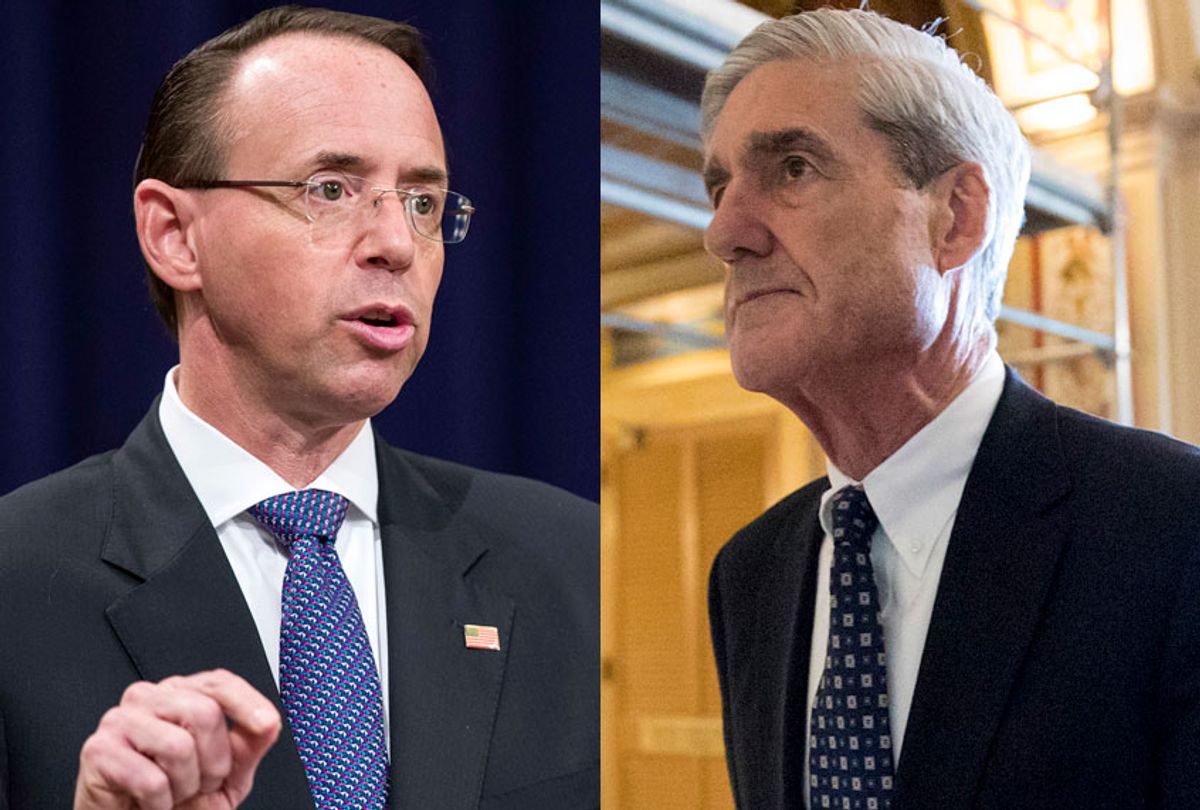Speaking at the Center for Strategic and International Studies Monday, the typically enigmatic Deputy Attorney General Rod Rosenstein made waves with provocative comments that seemed to offer hints about the Justice Department’s approach to the release of any report from Special Counsel Robert Mueller’s Russia investigation.
One of the outstanding questions about any public release of the investigation’s findings concerns the president and how any discovery of his potential wrongdoing could be revealed, given that he is unlikely to face indictment while in office. As Washington Post report Matt Zapotsky recounted, one portion of Rosenstein’s comments seemed particularly relevant to this question:
We’re eager to look to things that have gone wrong and figure out how we can best address them. one of the challenging issues we face in the department, and this is an issue that we’ll be discussing nationally, is the question of whether transparency is a good thing, and there’s a knee jerk reaction to suggest that we should be transparent about what we do in government, but there are a lot of reasons not to be transparent about what we do in government. … Just because the government collects information doesn’t mean that information is accurate, and it can be really misleading if you’re overly transparent about information that the government collects, so I think we do need to be really cautious about that. And that’s against not to comment on any particular case. There may be legitimate reasons for making exceptions, but as a general principle, my view is the Department of Just is best served when people are confident that we’re going to operate — when we’re investigating American citizens in particular — we’re going to do it with appropriate sensitivity to the rights of uncharged people … The guidance I always gave my prosecutors and the agents that I worked with during my tenure on the front line of law enforcement were if we aren’t prepared to prove out case beyond a reasonable doubt in court, then we have no business making allegations against American citizens.
He also, critically, made it clear that he has great respect for newly-appointed Attorney General William Barr, who he said the country can count on to do the right thing. This is of paramount importance because Trump has repeatedly made it clear that he would like, if possible, to intervene in the Mueller investigation, which made his selection of Barr an immediately suspect choice. But Rosenstein, who first appointed Mueller, has an almost unique position of independence from Trump, and his confidence about the sitting attorney general speaks volumes.
Rosenstein also expressed confidence in the special counsel regulations themselves, noting that if Mueller (or any special counsel) were overruled on a key decision by the attorney general, a report would have to be sent to Congress to explain why.
Unsurprisingly, Rosenstein’s comments created a stir. Though he said, for the most part, that he wasn’t addressing any particular case, the principles he laid out shows how he thinks about some of the central issues regarding how to make the Mueller investigation’s findings public.
They also, notably, seemed to reflect his ongoing opposition to former FBI Director James Comey’s decision to publicize negative information about Hillary Clinton when the bureau wrapped up its investigation into her emails.
But his comments about the fact that transparency is not always a good thing when it comes to law enforcement, and that prosecutors shouldn’t make allegations unless they’re prepared to prove them beyond a reasonable doubt in court, seemed to touch directly on outstanding issues in the Mueller investigation.
“If you are expecting Mueller/DOJ to willingly release a report that blasts Trump or other, un-indicted people in his orbit, please read these remarks today from Rod Rosenstein, who appointed Mueller and supervised most of his investigation,” said Zapotopsky.
“This is both 100% correct,” said former DOJ spokesperson Matthew Miller said of Rosenstein’s remarks, “and in no way contradicts the need for DOJ to turn over to Congress evidence of wrongdoing by a sitting president, the one person against whom DOJ says it cannot make a case in court.”
There seemed to be at least two different ways of interpreting Rosenstein’s remarks. He could have been indicating that people shouldn’t expect a damning report about the president from the DOJ. Or he could be saying that, if Mueller brings forward such a case, it will be air-tight and of the sort that lays out clear and demonstrable criminal activity. This ambiguity is almost certainly intentional on Rosenstein’s part.
While he did note that there may be exceptions to the general principles he described – and if any position demands exceptions, the presidency does — we can be pretty confident Rosenstein was sending this message: At least for most people involved in the special counsel’s investigation, they will either be charged, or Mueller won’t say much about them. He’s not going to release a slew of troubling, but non-criminal, allegations against Trump’s allies or others in his circle. And while that may be disappointing to some, there are good reasons for valuing this adherence to principle.


Shares